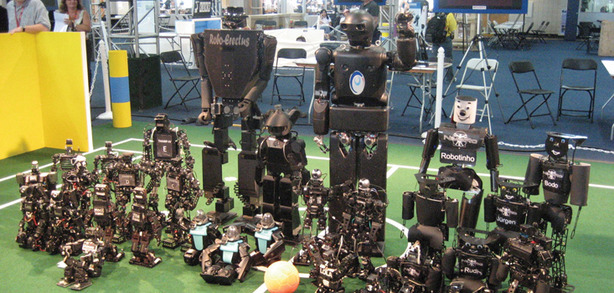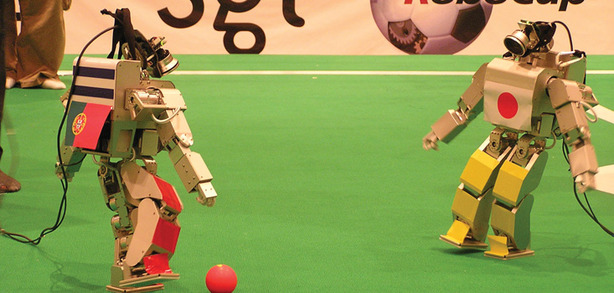Robocup
While some people may take consolation from the fact that computers are currently only beating us at board games, card games and maths, it seems that even the beautiful game isn’t safe from AI. In 1993, a group of Japanese researchers founded the Robot World Cup Initiative.The Robocup was set up to promote robotics and AI research in a way that was publicly appealing but still posed a formidable challenge to participants. The organisation also has a noble pipe dream and states on its website that "the ultimate goal of the Robocup project is, by 2050, [to] develop a team of fully autonomous humanoid robots that can win against the human world champion team in soccer".
Given that bipedal walking is an ability that few species on Earth have mastered, you’d be forgiven for being cynical. However, given the rate of progress in robotics over the past 20 years, many scientists believe that the progress made over the next 40 years may just be enough to achieve this goal.

With talk of football inciting feelings of patriotism for our wet, cold and overtaxed country, we contacted one of the few British entrants for Robocup, the OxBlue team from Oxford University. Speaking with the team’s Julian de Hoog, we learned about the robots, and OxBlue’s trials and tribulations with the Robocup.
"With robots you quickly learn to expect the unexpected," de Hoog said. "My colleague Jie was working on developing walking patterns for humanoid robots. For many days, his simulated bipedal robots took one or two steps and then fell over, which was funny to watch. They’ve learned to walk quite efficiently now though. In another research group, a robotic helicopter flew out of range and decided not to return. They’re still searching for it."
Fortunately, the lost helicopter is unlikely to possess sufficiently advanced intelligence to spawn a race of killer machines, so for now at least, we can sleep easy at night. We asked De Hoog what he thought about his robots’ level of intelligence. "The behaviour exhibited by the simulated soccer robots [is] highly intelligent," he replied. "If there was a team of humans controlling a team of 11 simulated robots in that specific league, say by game controllers of some kind, I’m certain they would lose most of their games against the simulated teams."

We asked Jie Ma, another member of OxBlue, about the hardware used to run the robots. "We’re using both Linux and Windows, and our robots are implemented in C++," he informed us. "In competitions such as Robocup 2008, we used four desktops with Intel Pentium E2160 CPUs and 2GB of RAM for each team."
Much like the pokerbot Polaris, the robots in Oxford’s football team learn from their mistakes and the behaviour of their opponents. De Hoog told us that learning is rampant. "Many teams use learning in the build-up to competition. Learning is applied both to low-level behaviour, such as learning how to shoot a moving ball in a particular direction and high-level behaviour, such as learning optimal team formations based on parameters describing certain game situations." Finally, it looks as though England might actually have a chance at winning the World Cup again.

MSI MPG Velox 100R Chassis Review
October 14 2021 | 15:04










Want to comment? Please log in.